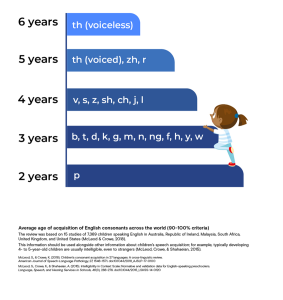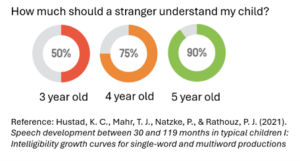When Speech Isn’t Clear: How to Help Your Child
- Do you often find it hard to understand what your child is saying?
- Do other children your child’s age seem much clearer than your child when they speak?
- Is your child mostly understood by close family, but not by others?
- Does your child seem frustrated when they are not understood?
Read on to find out more.
Why might my child be talking unclearly?
As children learn to talk, it’s normal for them to make pronunciation errors. Most children gradually outgrow these errors as their speech skills develop.
Sounds that are expected to develop at different ages:


However, some children make speech errors that are unusual for their age or persist longer than expected. These may be signs of a speech sound disorder. With the right support, these children can learn to speak more clearly and confidently.
Some reasons for persistent unclear speech include:
- Articulation Disorder: Difficulty with specific sounds, often due to how the articulator (e.g. tongue, lips or jaw) is positioned. For example, an interdental lisp is when a child produces his ‘s’ sound with his tongue between his teeth instead of behind them (e.g. ‘sun’ can sound like ‘thun’).
- Childhood Apraxia of Speech (CAS): This is a motor planning difficulty where the brain knows what it wants to say but has trouble coordinating the precise movements of the mouth needed for clear speech. It’s not caused by muscle weakness, but rather by challenges in planning and sequencing the movements required for speaking.
- Dysarthria: This is caused by weak speech muscles, often linked to neurological conditions (e.g. cerebral palsy or Down syndrome).
- Phonological Disorder: Patterns of sound errors that make speech unclear, even though your child’s speech muscles work well. For instance, replacing ‘c’ or ‘k’ sounds with ‘t’, resulting in the pronunciation of ‘cat’ as ‘tat’ and ‘kiss’ as ‘tiss’
What Can I Do at Home?
To support your child’s speech development at home, try the following strategies:
- Model Clear Speech
- Speak slowly so your child can hear and imitate the sounds more clearly.
- Give your child time to respond—don’t rush them.
- Model correct pronunciation, but don’t insist they repeat after you every time.
- Face-to-Face Interaction
- Talk to your child face-to-face whenever possible.
- Children with unclear speech often use facial expressions and gestures to help communicate—seeing your face helps them learn too.
- Minimize Background Noise
- Turn off the TV or radio during speech practice or important conversations.
- This helps your child better focus on listening and speaking.
- When You Don’t Understand Your Child
If your child’s message isn’t clear:
- Ask them to say it again
- Repeat back part of what you understood, e.g., “Going where?” or “Mum said what?”
- Ask for more information: “Can you tell me more?”
- Encourage them to show you what they’re talking about
Once you understand the message, repeat it back to your child to confirm and give them a clear model.
How Can Speech Therapy Help?
Once the factors contributing to your child’s speech difficulties are identified, your speech therapist can develop a personalised therapy plan to support their specific needs and goals.
- For articulation issues, we teach how to move the tongue, lips, and jaw for clearer sounds.
- For coordination challenges, we break down speech into manageable steps and practise them in fun, engaging ways.
- For phonological difficulties, we help your child hear and use sound differences meaningfully (like “key” vs. “tea”).
- We may also teach compensatory strategies—such as speaking more slowly or loudly to improve clarity.
- Throughout therapy, we use motor learning principles, with repetition and feedback to help your child learn and retain new speech skills.
Our speech therapists incorporate well-established therapy methods such as minimal pair therapy and integral stimulation, for children with motor speech difficulties.
We are also trained in a range of evidence-based approaches to support children with unclear speech. These include:
- TalkTools®
- Orofacial Myofunctional Therapy
- PROMPT (Prompts for Restructuring Oral Muscular Phonetic Targets)
- O.R.E. (Integrating the Mouth with Sensory and Postural Functions)
- LSVT LOUD® (Lee Silverman Voice Treatment)
Further information
For more information about unclear speech in children, visit https://www.rcslt.org/speech-and-language-therapy/clinical-information/speech-sound-disorders/
To find out more about speech therapy at Magic Beans, contact us at +65 8777 3171 or info@magicbeans.sg.

